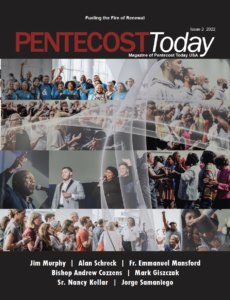Meditation and Questions for Reflection or Group Discussion
Mass Readings:
- 1st Reading: Nehemiah 8:2-6, 8-10
- Responsorial: Psalm 19:8-10, 15
- 2nd Reading: 1 Corinthians 12:12-30
- Gospel: Luke 1:1-4; 4:14-21
Opening Ourselves in a Greater Way to the Graces of Mass and the Scriptures
Today is holy to your Lord your God. (Nehemiah 8:9)
In today’s first reading, the Israelites were reaffirming their covenant with the Lord as they listened to Ezra the priest reading and interpreting the Scriptures. Having had their city overrun, having been sent into exile, and now having returned as a ragtag group to try to rebuild their lives, the people had endured one humiliating event after the other. But now, they saw a light at the end of the tunnel. They were beginning to come together again.
Ezra gave the people three short messages. First, he told them, “Today is holy to your Lord.” Then, he urged them to celebrate their deliverance with “rich foods” and “drink.” Then, he told them, “Rejoicing in the Lord must be your strength!” (Nehemiah 8:9-10).
This reading also describes the people’s response. They gathered for the entire morning, from daybreak until midday, to pray. And their prayer was one of full involvment: They listened “attentively.” They stood up, raised their hands, bowed down in worship, and cried out, “Amen, amen” (Nehemiah 8:3, 6).
Now, let’s shift our minds to today. Each Sunday, we come to Mass to celebrate what God has done for us. As the day of the resurrection, every Sunday is holy. Like the Israelites, we celebrate our deliverance from death. And like them, we look forward to our final homecoming—heaven. We have much to celebrate!
So let’s be sure to come to Mass today ready to express our gratitude for Jesus’ cross and to rejoice in our freedom.
But there is more. If you come with a listening heart, the word of God will come to life for you. Jesus’ sacramental presence will fill your heart with his love and his grace to live a holy life. If you come with the right disposition, as the Israelites did, God will surely fill you up!
“Thank you, Jesus, for your deliverance! Lord, I believe in you and celebrate your love today.”
Download this reflection with discussion questions here.
(Many thanks to The Word Among Us (www.wau.org) for allowing us to use meditations from their monthly devotional magazine. Used with permission.)
Sunday, January 24, 2016
Questions for Reflection or Discussion
- In the first reading, we hear how the word of God so touched the hearts and moved all the people who “listened attentively.” Yet the reading goes on to say that “the people were weeping when they heard the words of the law.” The reading ends with these words: “Do not be saddened this day, for rejoicing in the Lord must be your strength.” Why do you think the people were saddened when they first heard the Scriptures read? Why do you think they were told to rejoice in the Lord, rather than weep?
- The responsorial psalm also speaks of the effect the word of God has on those who “listen”: i.e., life, refreshment, wisdom, joy, enlightenment, etc. How often during the week do you turn to the Scriptures for your strength? How important is it to commit to reading and meditating on the Scriptures every day, for example, the daily Mass readings? What are some ways God has touched you through your reading of Scriptures? If you don’t already do it, are you willing to commit to a daily time of Scripture reading? If not, why not?
- In the second reading, St. Paul continues the theme he began in last Sunday’s reading: we are all members of one body, and each of us has an important part to play in building the Church. He reminds us that “the parts of the body that seem to be weaker are all the more necessary.” Why do you think this is true? He also tells us that there should be “no division in the body.” What steps can you take to heal any divisions and bring more unity to your family, your parish, and your community?
- St. Paul also says that we must have a “concern for one another. If one part suffers, all the parts suffer with it; if one part is honored, all the parts share its joy.” How can you respond to the opportunities in your parish or community to reach out to those who are suffering or have great needs?
- In the Gospel, Jesus tells us that he has fulfilled the words of the prophet Isaiah to ‘bring glad tidings to the poor”, “proclaim liberty to the captives and recovery of sight to the blind”, and “let the oppressed go free.” Saint John Paul II once said, “Sometimes even Catholics have lost or never had a chance to experience Christ personally; not Christ as a mere ‘paradigm’, but the Living Lord: ‘the way, the truth, and the life’ (John 14:6).” What specifically can you do to get to know the Jesus better, not “as a mere paradigm or value”, but as your living Lord, as your way, your truth, your life?
- The meditation describes the reaction of the Israelites “as they listened to Ezra the priest reading and interpreting the Scriptures.” In addition, the meditation reminds us that “Each Sunday, we come to Mass to celebrate what God has done for us” and “If you come with a listening heart, the word of God will come to life for you. Jesus’ sacramental presence will fill your heart with his love and his grace to live a holy life. If you come with the right disposition, as the Israelites did, God will surely fill you up!” What is the attitude of your heart and mind when you come to Mass? What is the attitude of your heart and mind when the word of God is read at Mass? What steps can you take to allow Mass to have a greater impact on your life — and to hear God speaking to you more clearly through the Scriptures read and be moved by them?
- Take some time now to pray and thank the Lord for what he did for you on the Cross and what we celebrate at every Mass. Use the prayer at the end of the meditation as the starting point.
[The discussion questions were created by Maurice Blumberg, a director of partner relations for The Word Among Us Partners, (http://www.waupartners.org/); a ministry of The Word Among Us (www.wau.org) to the military, prisoners, women with crisis pregnancies or who have had abortions, and college students. He is also a member of the National Service Committee Council of the Catholic Charismatic Renewal. Maurice was also the founding Executive Director of the National Fellowship of Catholic Men, for which he is currently a Trustee (http://www.nfcmusa.org/). He can be contacted at mblumberg@wau.org or mblumberg@aol.com.]


 Click Here for us to pray for your intentions through our new website.
Click Here for us to pray for your intentions through our new website. 
